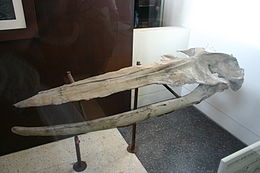Parietobalaena is an extinct genus of baleen whale, belonging to the family Pelocetidae. Fossils are found in Miocene-aged marine strata in North America, Europe, Australia, and Japan, including the Temblor and Itahashi formations.[1][2][3][4][5] Based on previous estimates of juvenile specimens, Tsai (2017) suggested a body size of 12-15 m for P. yamaokai, akin to that of the gray whale.[5]
| Parietobalaena Temporal range: Miocene,
| |
|---|---|

| |
| Parietobalaena palmeri, AMNH | |
| Scientific classification | |
| Domain: | Eukaryota |
| Kingdom: | Animalia |
| Phylum: | Chordata |
| Class: | Mammalia |
| Order: | Artiodactyla |
| Infraorder: | Cetacea |
| Family: | †Pelocetidae |
| Genus: | †Parietobalaena Kellogg 1924, p. 1 |
| Species | |
| |


References
edit- ^ "Parietobalaena". Fossilworks. Retrieved 17 December 2021.
- ^ Steeman, M. E. (March 2010). "The extinct baleen whale fauna from the Miocene-Pliocene of Belgium and the diagnostic cetacean ear bones". Journal of Systematic Palaeontology. 8 (1): 63–80. Bibcode:2010JSPal...8...63S. doi:10.1080/14772011003594961.
- ^ Gol'din, Pavel; Radović, Predrag (2018-01-22). "A Middle Miocene Baleen Whale from Bele Vode in Belgrade, Serbia". Rivista Italiana di Paleontologia e Stratigrafia (Research in Paleontology and Stratigraphy). 124: N. 1 (2018). doi:10.13130/2039-4942/9751.
- ^ Kellogg, R. (1931). "Pelagic mammals of the Temblor Formation of the Kern River region, California". Proceedings of the California Academy of Sciences. 19 (12): 217–397.
- ^ a b Tsai, Cheng-Hsui (22 October 2017). "A Miocene breeding ground of an extinct baleen whale (Cetacea: Mysticeti)". PeerJ. 5: e3711. doi:10.7717/peerj.3711. PMC 5571789. PMID 28848691.
Sources
edit- Bisconti, M.; Lambert, O.; Bosselaers, M. (2013). "Taxonomic revision of Isocetus depauwi (Mammalia, Cetacea, Mysticeti) and the phylogenetic relationships of archaic 'cetothere' mysticetes". Palaeontology. 56 (1): 95–127. Bibcode:2013Palgy..56...95B. doi:10.1111/j.1475-4983.2012.01168.x. ISSN 0031-0239. OCLC 826744606.
- "M. Bisconti et al. 2013". The Paleobiology Database. Archived from the original on 2013-10-14.
- Kellogg, R. (1924). "Description of a new genus and species of whalebone whale from the Calvert Cliffs, Maryland". Proceedings of the United States National Museum. 63 (2483): 1–14. doi:10.5479/si.00963801.63-2483.1. hdl:10088/15284. OCLC 631781115.
- "R. Kellogg 1924". Fossilworks.
- Otsuka, H.; Ota, Y. (2008). "Cetotheres from the early Middle Miocene Bihoku Group in Shobara District, Hiroshima Prefecture, West Japan". Miscellaneous Reports of the Hiwa Museum for Natural History. 49: 1–66.
- "H. Otsuka and Y. Ota 2008". Fossilworks.
- Van Beneden, P, J. (1880). "Les Mysticètes à courts fanons des sables des environs d'Anvers". Bulletin de l'Académie Royale des Sciences, des Lettres et des Beaux-Arts de Belgique. 2. 11–27.
{{cite journal}}: CS1 maint: multiple names: authors list (link)